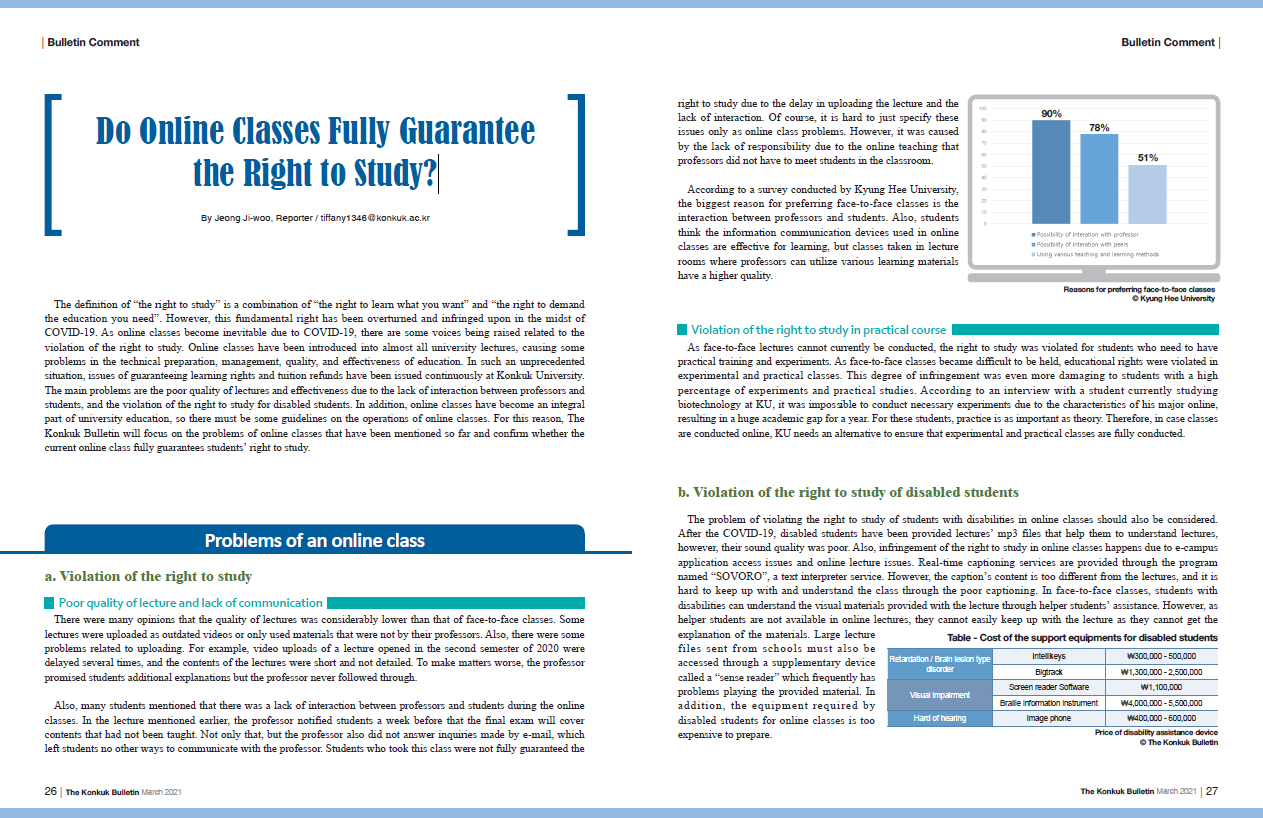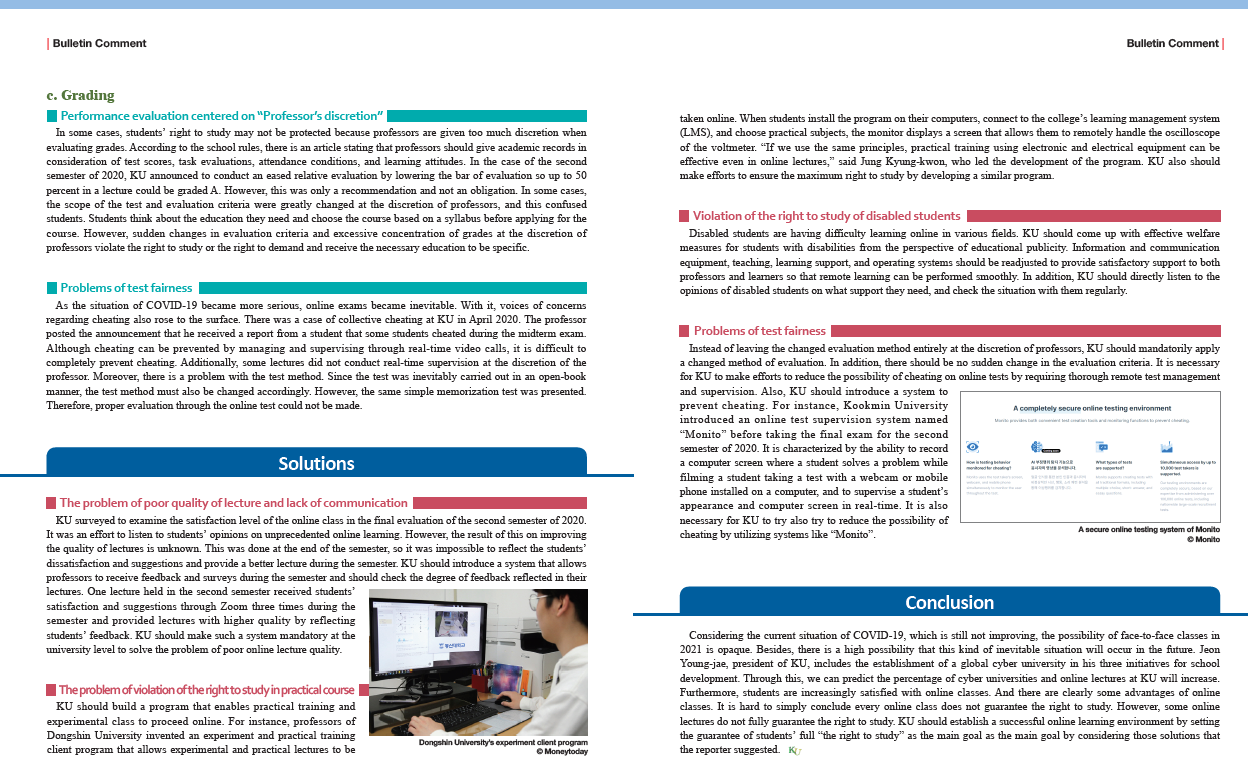
|
The definition of “the right to study” is a combination of “the right to learn what you want” and “the right to demand the education you need”. However, this fundamental right has been overturned and infringed upon in the midst of COVID-19. As online classes become inevitable due to COVID-19, there are some voices being raised related to the violation of the right to study. Online classes have been introduced into almost all university lectures, causing some problems in the technical preparation, management, quality, and effectiveness of education. In such an unprecedented situation, issues of guaranteeing learning rights and tuition refunds have been issued continuously at Konkuk University. The main problems are the poor quality of lectures and effectiveness due to the lack of interaction between professors and students, and the violation of the right to study for disabled students. In addition, online classes have become an integral part of university education, so there must be some guidelines on the operations of online classes. For this reason, The Konkuk Bulletin will focus on the problems of online classes that have been mentioned so far and confirm whether the current online class fully guarantees studentsʼ right to study.
Problems of an online class
a. Violation of the right to study
Poor quality of lecture and lack of communication
There were many opinions that the quality of lectures was considerably lower than that of face-to-face classes. Some lectures were uploaded as outdated videos or only used materials that were not by their professors. Also, there were some problems related to uploading. For example, video uploads of a lecture opened in the second semester of 2020 were delayed several times, and the contents of the lectures were short and not detailed. To make matters worse, the professor promised students additional explanations but the professor never followed through.
Also, many students mentioned that there was a lack of interaction between professors and students during the online classes. In the lecture mentioned earlier, the professor notified students a week before that the final exam will cover contents that had not been taught. Not only that, but the professor also did not answer inquiries made by e-mail, which left students no other ways to communicate with the professor. Students who took this class were not fully guaranteed the students right to study due to the delay in uploading the lecture and the lack of interaction. Of course, it is hard to just specify these issues only as online class problems. However, it was caused by the lack of responsibility due to the online teaching that professors did not have to meet students in the classroom.
According to a survey conducted by Kyung Hee University, the biggest reason for preferring face-to-face classes is the interaction between professors and students. Also, students think the information communication devices used in online classes are effective for learning, but classes taken in lecture rooms where professors can utilize various learning materials have a higher quality.
Violation of the right to study in practical course
As face-to-face lectures cannot currently be conducted, the right to study was violated for students who need to have practical training and experiments. As face-to-face classes became difficult to be held, educational rights were violated in experimental and practical classes. This degree of infringement was even more damaging to students with a high percentage of experiments and practical studies. According to an interview with a student currently studying biotechnology at KU, it was impossible to conduct necessary experiments due to the characteristics of his major online, resulting in a huge academic gap for a year. For these students, practice is as important as theory. Therefore, in case classes are conducted online, KU needs an alternative to ensure that experimental and practical classes are fully conducted.
b. Violation of the right to study of disabled students
The problem of violating the right to study of students with disabilities in online classes should also be considered. After the COVID-19, disabled students have been provided lecturesʼ mp3 files that help them to understand lectures, however, their sound quality was poor. Also, infringement of the right to study in online classes happens due to e-campus application access issues and online lecture issues. Real-time captioning services are provided through the program named “SOVORO”, a text interpreter service. However, the captionʼs content is too different from the lectures, and it is hard to keep up with and understand the class through the poor captioning. In face-to-face classes, students with disabilities can understand the visual materials provided with the lecture through helper studentsʼ assistance. However, as helper students are not available in online lectures, they cannot easily keep up with the lecture as they cannot get the explanation of the materials. Large lecture files sent from schools must also be accessed through a supplementary device called a “sense reader” which frequently has problems playing the provided material. In addition, the equipment required by disabled students for online classes is too expensive to prepare.
c. Grading
Performance evaluation centered on “Professor’s discretion”
In some cases, studentsʼ right to study may not be protected because professors are given too much discretion when evaluating grades. According to the school rules, there is an article stating that professors should give academic records in consideration of test scores, task evaluations, attendance conditions, and learning attitudes. In the case of the second semester of 2020, KU announced to conduct an eased relative evaluation by lowering the bar of evaluation so up to 50 percent in a lecture could be graded A. However, this was only a recommendation and not an obligation. In some cases, the scope of the test and evaluation criteria were greatly changed at the discretion of professors, and this confused students. Students think about the education they need and choose the course based on a syllabus before applying for the course. However, sudden changes in evaluation criteria and excessive concentration of grades at the discretion of professors violate the right to study or the right to demand and receive the necessary education to be specific.
Problems of test fairness
As the situation of COVID-19 became more serious, online exams became inevitable. With it, voices of concerns regarding cheating also rose to the surface. There was a case of collective cheating at KU in April 2020. The professor posted the announcement that he received a report from a student that some students cheated during the midterm exam. Although cheating can be prevented by managing and supervising through real-time video calls, it is difficult to completely prevent cheating. Additionally, some lectures did not conduct real-time supervision at the discretion of the professor. Moreover, there is a problem with the test method. Since the test was inevitably carried out in an open-book manner, the test method must also be changed accordingly. However, the same simple memorization test was presented. Therefore, proper evaluation through the online test could not be made.
Solutions
The problem of poor quality of lecture and lack of communication
KU surveyed to examine the satisfaction level of the online class in the final evaluation of the second semester of 2020. It was an effort to listen to studentsʼ opinions on unprecedented online learning. However, the result of this on improving the quality of lectures is unknown. This was done at the end of the semester, so it was impossible to reflect the studentsʼ dissatisfaction and suggestions and provide a better lecture during the semester. KU should introduce a system that allows professors to receive feedback and surveys during the semester and should check the degree of feedback reflected in their lectures. One lecture held in the second semester received studentsʼ satisfaction and suggestions through Zoom three times during the semester and provided lectures with higher quality by reflecting studentsʼ feedback. KU should make such a system mandatory at the university level to solve the problem of poor online lecture quality.
The problem of violation of the right to study in practical course
KU should build a program that enables practical training and experimental class to proceed online. For instance, professors of Dongshin University invented an experiment and practical training client program that allows experimental and practical lectures to be taken online. When students install the program on their computers, connect to the collegeʼs learning management system (LMS), and choose practical subjects, the monitor displays a screen that allows them to remotely handle the oscilloscope of the voltmeter. “If we use the same principles, practical training using electronic and electrical equipment can be
effective even in online lectures,” said Jung Kyung-kwon, who led the development of the program. KU also should make efforts to ensure the maximum right to study by developing a similar program.
Violation of the right to study of disabled students
Disabled students are having difficulty learning online in various fields. KU should come up with effective welfare measures for students with disabilities from the perspective of educational publicity. Information and communication equipment, teaching, learning support, and operating systems should be readjusted to provide satisfactory support to both professors and learners so that remote learning can be performed smoothly. In addition, KU should directly listen to the opinions of disabled students on what support they need, and check the situation with them regularly.
Problems of test fairness
Instead of leaving the changed evaluation method entirely at the discretion of professors, KU should mandatorily apply a changed method of evaluation. In addition, there should be no sudden change in the evaluation criteria. It is necessary for KU to make efforts to reduce the possibility of cheating on online tests by requiring thorough remote test management and supervision. Also, KU should introduce a system to prevent cheating. For instance, Kookmin University introduced an online test supervision system named “Monito” before taking the final exam for the second semester of 2020. It is characterized by the ability to record a computer screen where a student solves a problem while filming a student taking a test with a webcam or mobile phone installed on a computer, and to supervise a studentʼs appearance and computer screen in real-time. It is also necessary for KU to try also try to reduce the possibility of cheating by utilizing systems like “Monito”.
Conclusion
Considering the current situation of COVID-19, which is still not improving, the possibility of face-to-face classes in 2021 is opaque. Besides, there is a high possibility that this kind of inevitable situation will occur in the future. Jeon Young-jae, president of KU, includes the establishment of a global cyber university in his three initiatives for school development. Through this, we can predict the percentage of cyber universities and online lectures at KU will increase. Furthermore, students are increasingly satisfied with online classes. And there are clearly some advantages of online classes. It is hard to simply conclude every online class does not guarantee the right to study. However, some online lectures do not fully guarantee the right to study. KU should establish a successful online learning environment by setting the guarantee of studentsʼ full “the right to study” as the main goal as the main goal by considering those solutions that the reporter suggested.


